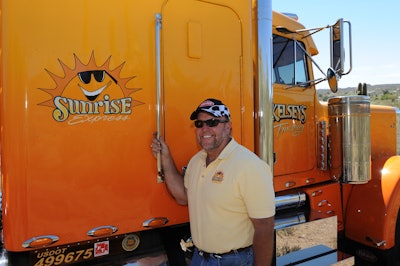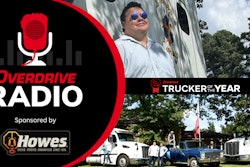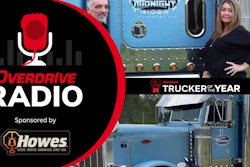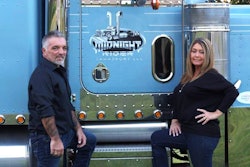
Building sustainable business with direct customers as a one-truck operation -- it's the holy grail for many an owner-operator, also among the most difficult goals to to bring to fruition. Shippers often prefer to work with larger trucking companies, with more capacity to move their freight.
Arizona-based owner-operator Ron Kelsey proved up to the challenge, though, throughout his career.
- The owner's flatbedding Kelsey's Trucking Inc. has served the same customers for 30-plus years.
- Work ethic, dedication, follow-through on promises key to retaining customer relationships.
- In Kelsey's case, considerable and clear pride in top-shelf equipment meticulously maintained have been infectious. Said one shipper customer: "I knew he would worry more about my product than I would.”
For more than 30 years, Ron Kelsey has moved flatbed freight for the same two customers. One of his close contacts, Art Wilkins, recently retired from Reliance Metal Center but worked with Kelsey for more than 25 years. Wilkins praises Kelsey’s business, which moved steel for him through the years.
“He always took pride in his truck, and if he said he was going to do a job, he did it, and on time,” Wilkins said.
If owner-operator Ron Kelsey's name rings familiar for you, that's no surprise: his long-running, pristine 1981 Peterbilt 359 "Sunrise Express" has cleaned up in Overdrive’s Pride & Polish competition, with first-place nods for Antique in 2021 and Working Bobtail in 2023.
Art Wilkins' confidence in Kelsey was always such that he never bothered with a key stipulation for loads Reliance brokered out through other companies -- namely, that those loads would be tarped no matter what. It helped that owner-operator Kelsey's regular run for many of those years, the relatively short haul from Southern California to Phoenix, rarely saw any rain to speak of. More importantly, though, Wilkins knew 100% that Kelsey "would worry more about my product than I would.” During his decades hauling for Wilkins, “Ron never lost, damaged or misdelivered any material” at all, full stop.

Similarly, Kelsey's relationship with Vinyltech extends back decades now. J.J. Blood, material management specialist with Vinyltech, said that during the 25-plus years Kelsey’s hauled PVC pipe for the company, he's been moving safely, on time. Most importantly, though, the owner-operator's been “representing the high level of service we expect from our drivers," Blood said. "We value our partnership with Ron for his dedication to reliability, safety, and customer care.”
[Related: Classic Pete 359 hauls in big Pride & Polish win after 4.1M miles of work]
Kelsey's customer commitment, managing those relationships over the decades, and maintenance of his long-running Peterbilt from cosmetics to bedrock mechanics have truly earned him recognition as Overdrive’s Trucker of the Month for July, putting the owner-operator in the running for the 2025 Trucker of the Year award.
 Overdrive's 2025 Trucker of the Year competition, sponsored by Commercial Vehicle Group and Bostrom Seating, recognizes business acumen and unique or time-honored recipes for success among owner-operators. Nominations are open through October for exceptional owner-operators, whether leased or independent. Nominate your business or that of a fellow owner (up to three trucks) via this link for a chance to win a custom replica of your tractor and a new seat from Bostrom and CVG.
Overdrive's 2025 Trucker of the Year competition, sponsored by Commercial Vehicle Group and Bostrom Seating, recognizes business acumen and unique or time-honored recipes for success among owner-operators. Nominations are open through October for exceptional owner-operators, whether leased or independent. Nominate your business or that of a fellow owner (up to three trucks) via this link for a chance to win a custom replica of your tractor and a new seat from Bostrom and CVG.
Kelsey's road to key customer relationships
Ron Kelsey’s trucking career started at the age of 18 in 1977 with oil field-related work in Wyoming for a short stint, before he moved back home to Phoenix and landed a job hauling bathtubs locally for Universal Rundle. When he turned 21 in 1980, he pulled for another outfit for the first time over-the-road with a flatbed.
He hauled for other companies for just a few years before, in 1984, he bought the truck that would become the face of his business for the rest of his trucking career.
He was driving for a one-truck owner at the time and “kind of running the truck myself anyway,” Kelsey said, outside of dispatch, which was handled by a fleet the truck was leased to. The owner “was paying for fuel, of course, and repairs and everything,” but extended Kelsey the flexibility to essentially run how he wanted to.
Kelsey’s penchant for country dancing -- two-step swing and the like -- led him to that first and only truck purchase. He was at a bar one night and met the woman who owned the ’81 Pete, along with two other trucks. The '81 Pete that would eventually become Kelsey's was parked out in front of the place. As he and owner danced and talked, he came to find out her grandfather invented torque converters, “so she bought the trucks for a tax write-off,” Kelsey said.
He went to work for her, first driving a Freightliner cabover before she put him in the 1981 Peterbilt 359 in 1983, where again Kelsey ran the truck "like it was my own," he said. She wasn't long for trucking, though. In August 1984 he bought the 359.
“She gave me a smoking deal on it," he said. "I just kind of fell into" business, of a fashion.
Through 1990, he leased the truck to Landstar (Inway at the time), then a couple other companies. In 1994, he hung out his shingle with his own authority as Kelsey’s Trucking Inc.
Flatbed freight has never been plentiful leaving the Phoenix area, where Kelsey's based. Wasn't then, isn't now, he said, but his girlfriend at the time wanted him to come off the road to be closer to home. He found Vinyltech first and started running the Phoenix-to-Los Angeles lane for them.
Vinyltech likes using owner-operators because “their company here is built on on-time delivery,” he said. The company tried larger carriers at one time, but Kelsey said the freight would end up in a trucking company’s yard, not delivered on time. With owner-operators, it’s loaded and delivered when needed, he said.
“They appreciate us just as much as we appreciate them,” he added.
Much the same can be said about Reliance, he added, who he "locked in" with for the run back from L.A. in those early days with authority. He was initially hesitant. "They were a bigger outfit," he said, but ultimately "steady. A lot of my buddies would chase a little bit higher-paying freight, but in the long run, you know, it’s like the turtle and the hare.”
As with Vinyltech, he's seen Reliance work with “bigger carriers," too, he added, "and their stuff would get damaged or wet or wouldn’t be delivered on time. ... With the independents that they would use, we would take care of their freight” -- a big part of how he’s been able to maintain that relationship over three decades.
“They knew when they made a phone call to me that they don’t have to call me anymore, that that load was there, it was done, it was going to be there on time,” he said.
That tip-top truck -- in tip-top shape
 Kelsey's 1981 Peterbilt 359 is shown here loaded with PVC pipe -- freight he's hauled for the same customer for more than 30 years. The pipe's loaded on a 2012 Reitnouer flatbed that he bought new and still operates today.
Kelsey's 1981 Peterbilt 359 is shown here loaded with PVC pipe -- freight he's hauled for the same customer for more than 30 years. The pipe's loaded on a 2012 Reitnouer flatbed that he bought new and still operates today.
Through the decades, of course, there's the 1981 Peterbilt 359 that started it all. It was a stock 359 when he bought it, and the first modifications he made over the next couple of years were to the interior, putting in new door panels and changing the interior color scheme. The truck’s exterior was first repainted in 1990 to the colors still on the rig today.
Because Kelsey can no longer run in California given the truck's age, his out-and-back bread and butter haul West is to Las Vegas. He also trucks pipe to Texas often enough these days -- San Antonio, Austin, Dallas-Fort Worth -- and can load steel out of Houston back to Phoenix.
While on paper the 359 is certainly old, it's never really seemed that way to him with each passing year because he’s always done something to refresh it, making it like new again. He’s reworked the interior a total of three times -- most recently in 2006 -- and added custom pieces around the exterior along the way.
 The flooring of that interior shown started out as marble just between the seats. But he's since expanded it to run from the sleeper to just in front of the seats.
The flooring of that interior shown started out as marble just between the seats. But he's since expanded it to run from the sleeper to just in front of the seats.
“It’s never gotten old to me,” he said. “It still actually looks better now than it did the day I bought it.”
The biggest changes made, though, weren't cosmetic at all. He swapped the original Cummins Big Cam II for a Cat 3406E in 1994, the year he got his authority. After 1.5 million miles on that second engine, he put in a 6NZ Cat C15 that has 500,000 miles on it today. Kelsey had the original Cummins “tuned up pretty good,” he said, and had to rebuild around every 250,000 miles -- “I just planned for it, basically," but "that was hurting me a lot.”
The first Caterpillar swap in 1994 "was night and day. … As soon as I put this Cat in in ’94, that changed the game as far as repairs, maintenance. Started really making a lot more money because I had less downtime and less repairs.”
 Today, the rig's C15 Cat is show-quality with paint and chrome.
Today, the rig's C15 Cat is show-quality with paint and chrome.
Joined at the hip -- or the frame rail, as it were -- with the 359 for so long, Kelsey knows the feel, the sound of the unit so well, "if something doesn't feel right, I know where to look," he said. “I know every square inch of this thing."
He changes oil every 12K-15K miles and greases every 7,500. He keeps a close eye on tires and brakes and, “when it comes time to pull maintenance, I do maintenance,” pure and simple, he said.
[Related: How trucking's 'supposed to be done': Trucker of the Month Southpoint Exchange]
Advice for new and aspiring owners -- for the long term
Ron Kelsey's principal freight partners, he said, have been good to him on the rates front through the years, with both sides of the arrangement making concessions when necessary to keep the relationship strong.
“It’s a tough business,” he said. “I’m very fortunate at what I did” finding customers he’s been able to stick with -- and who've stuck with him. To be truly independent, he felt, finding direct customers is key to success. “Do not use a load board, a broker board,” he added. “There’s too much money that’s taken off the top.”
Go into the business with plenty of cash in the bank, he advised aspirant owner-operators. $50K-$60K, in his mind, is a good target for business expenses to backstop the worst happening, like a big unexpected repair. To help with cash flow, too: “You’re going to have to pay for your fuel,” he said. If you're using brokers starting out, you might not see payment from some for a month or longer.
“You need a lot of capital to run a business in trucking,” he emphasized.
[Related: One owner-op's secret weapons for trucking biz bookkeeping, analysis]
After 48 years behind the wheel of a truck, Kelsey is entering the late stages of a long trucking career. He’s already slowed down considerably from past years, running in the most recent couple years just 40,000 miles annually. He's certainly more choosy with the loads he takes.
To set himself up for retirement, Kelsey's managed personal finances through the years, investing well, paying off houses, he said. “I’m debt-free, and a lot of that comes with just working, being consistent. You can make a lot of money in trucking, you really can. I’m very fortunate to have this little niche that I have, and other guys will agree with me. When you find that niche and next thing you know, you’re going, ‘Wow, I can put away a lot of money. I can pay off my house.’”
The ”million-dollar question,” as Kelsey put it for his retirement is what he’s going to do with “Sunrise Express” when he does decide to retire. It’s not necessarily part of his retirement plan as far as selling it to fund his retirement. He still enjoys taking it to truck shows and has considered turning it into a motorhome to travel in.
He noted he’s not in a mindset now where he even could sell it.
“The truck is an extension of me,” he said. “It’s a part of me, and that’s how I feel about it.”
[Related: For sale by owner-operator: Notes on the big unload at retirement]









